|
|
| home | exhibitions | interviews | features | profiles | webprojects | archive |
|
Joe Clarke of Goldfish Fine Art, Penzance interview Rupert White
Can you say something about yourself - particularly about what you
did before you came to Cornwall and what it was
that brought you here?
I moved to Cornwall at the age of 18 with
my then girlfriend and now wife Hollie, who I have been with since
school. I knew I didn't want to be a part of the real world, and
after coming to Cornwall on family holidays since childhood I
guessed that Cornwall would be as near to the sort of 'not-so-real-world' that
I might be able to get. It was the quality
of light that drew me here. Yeah right of course it was - as an 18
year old the surf had something to do with it also. I was actually
also drawn to the celtic
history of the place. As a child I would wander in grave yards
alone, I used to find it important in someway to be reminded of my
insignificance. I guess on some deep level Cornwall provided me with
a similar thing... Hollie has been on the end of my
tempestuous moods for years, and I know it has been difficult
because the challenge has been so great. From the start I wanted to
do something of cultural importance - I would often give works away
to people that I liked rather than sell them to those that I didn't.
I know I am not the best business model,
but in turn know that integrity is more important to me. This has
led to a life time so far of frustration but now much more joy,
because it is nice to have these things recognized. Expectations are
always difficult because my boundaries
always move. I try not to have expectations. I
honestly just please myself and do the very best that I can. I do know however that there was not a gallery showing the sort of work that I like until I started doing it. That is not to say that I don't like other galleries now. I have a lot of respect for those that take risks and try to show where Cornwall is going rather than just where it has been.
As a good forward-thinking gallery there is a constant battle to stand out from the rest. There are very few platforms or mechanisms to do so - the press won't do it and there is little in the way of critical attention to point the more discerning at artists doing the good stuff. This must and will change, it is a bit of a mission for me. I do think that the establishment down here have seen the private galleries as purely commercial, and therefore not worthy of real attention or respect. This really pisses me of because I know that it is not true. There are a few people that run galleries who put blood, sweat and tears in to what they believe in - this is an asset to the area and should be very very appreciated. Not all galleries are parasites. Andrew
Litten gave me torn out article the other day, from the Times
written by Waldemar Januszczak about Annely
Juda, praising the role of a good gallerist for highlighting art
work that otherwise may not reach the public arena. I was really
moved by it, that Andrew had thought that I might need it, and
really inspired actually. I think that London gallerists are perhaps
more respected by the establishment than Cornish ones. Perhaps this
will change.
When you say the establishment I 'm guessing you mean the Tate, Newlyn and other public galleries. I think over the last couple of decades they've tended to see it as their mission to bring art into the county from outside - which is part of their remit after all - but there's a danger it happens at the cost of recognising local art. Its a difficult balancing act for them.
In terms of moving things on down here it
absolutely doesn't help that the art
journals, art critics and the rest of the structure
that supports and validates new art doesn't
penetrate much further than Bristol. Its easy under those
circumstances to presume that things that happen further West are
not so important or good - whereas in fact its
simply an accident of geography. Would you agree? My own view is
that we have to do what we can to recognise what is important and
unique about Cornwall - and work with that. But,
and this is a complex issue, you can't necessarily apply the same
criteria for judging work down here. I honestly believe we are on the verge of an exciting climate of change. I have met and spoken pretty openly with Mark Osterfield from the Tate on numerous occasions and I have to say that he seems open and enthusiastic. I do believe that Tate see the need to recognise and I think that the appetite is there. I believe that the same applies to James green from Newlyn, and I have been assured that Martin Clarke the new creative director of Tate at Ives will also be enthusiastic, bold and passionate. I look forward to meeting him. What I believe to be vital is for artists to live up to the challenge, to push themselves. If ambition is present then I am sure that the Tate and the Newlyn are much more likely to show recognition from now on. There is a lot at stake, a lot could be lost, if there is no support to continue the legacy of the place. Although it was in my opinion faulted, Art Now did seem to indicate an appetite to give recognition.
I often feel that the lifestyle press in
Cornwall are much more interested in froth than things with
weight that could get us taken very seriously as an area of
creativity. I'm thinking hard and hoping
to work hard on this. Serious collectors need faith in order to jump
in, we need to sort a lot out locally to aid this.
To be moved is a major ingredient in life. I need emotion, and maybe I need a roller coaster of it. I will work hard and relentlessly for what I believe in, either that or I wont lift my head from the pillow. I am finding that my need for passion within the art world is more frenzied lately. There is lots of talk of projects , statistics and such like - this wears me down. I like the more intangible aspects to the arts, which leads to passion.
I always think of artists like Andrew Lanyon and David Kemp and a number of the other artists as re-presenting elements that were repressed, purged or eliminated by the modernists of St Ives, that are specifically to do with the human body and the human condition: eg mortality, sexuality etc. These modernist expressionist/surrealist aspects have come back with avengence for many of the Goldfish artists. I know your point and I kind of agree, although I'm not sure its that simple. Perhaps it was repressed by the packagers not the artists. You see I would not call artists like Hilton repressed, and there was Karl Weschke and I'm sure others also that demonstrated expression, the dark as well as the light. Wallis himself was quiet free in his work, so maybe it is a case of each following there own path rather than this one rule suits all. I like the idea of opening it all up again a bit. So we can see the past more clearly and then in doing so embrace the future more freely.
Outsider has been said, and I think that this is true in the purest sense of the term. It is about being aware of ones own patch, one's own life rather than the art-world as a whole may be. This has nothing to do with naivete: it has far more to do with free-thinking. I see it as more to do with primitivism, getting in touch with our own base humanity and our place amongst things, not to do with art at all. This is affecting for me. The concept of Outsider Art is often used as a category. I am much more interested in the individual than I am the category. The more free-thinking the individual, the more there can be to learn from them.
I believe in Cornwall as a place of refuge for those that need it, a place to escape the mainsteam, but also a place to discover our purpose. I think that this was the pursuit of many of the postwar artists, coming to Cornwall to search for clarity. I see this as the link between those who come here, a kind of primitive exploration or need to clarify, as a place this seems to inspire perfectly my understanding of the inquisitive creative spirit. This is a psychological theory maybe which I find more useful in piecing things together than any aesthetic theory. If we follow this thread then it allows
to follow the chronology of the place right up to the present so
that people could understand and see why something may have a Cornishness
about it. It is my aim to put together a book and public exhibition
as soon as I reach a point that I can explain it better. The working title
is 'primitive complexity': about
the strange, poetic, obsessive and deeply personal task of walking
your own path and looking for your own truth away from the spotlight. I
guess it is my understanding of what is special about Cornwall and
the asylum that it offers.
28/7/2007 |
|
|

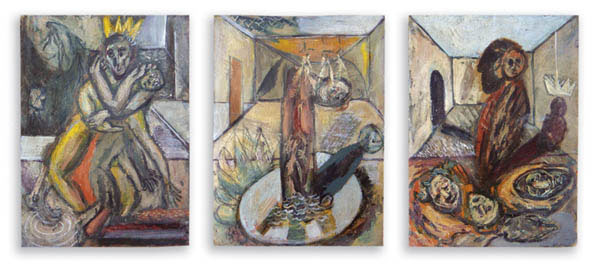
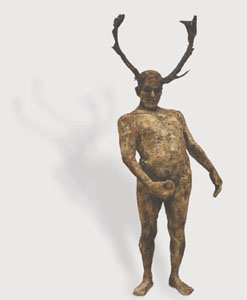
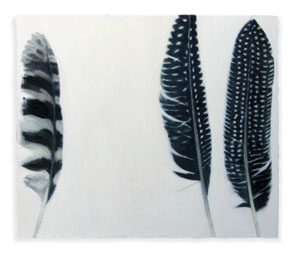 I
absolutely agree with this. I hope that it will be clearer what is
unique about Cornwall in time, as you know I have my views.
I
absolutely agree with this. I hope that it will be clearer what is
unique about Cornwall in time, as you know I have my views.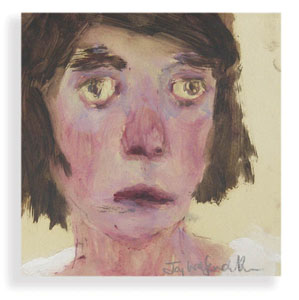
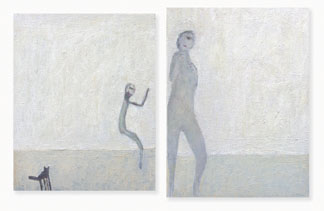
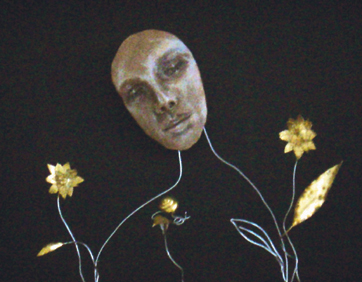 P
P